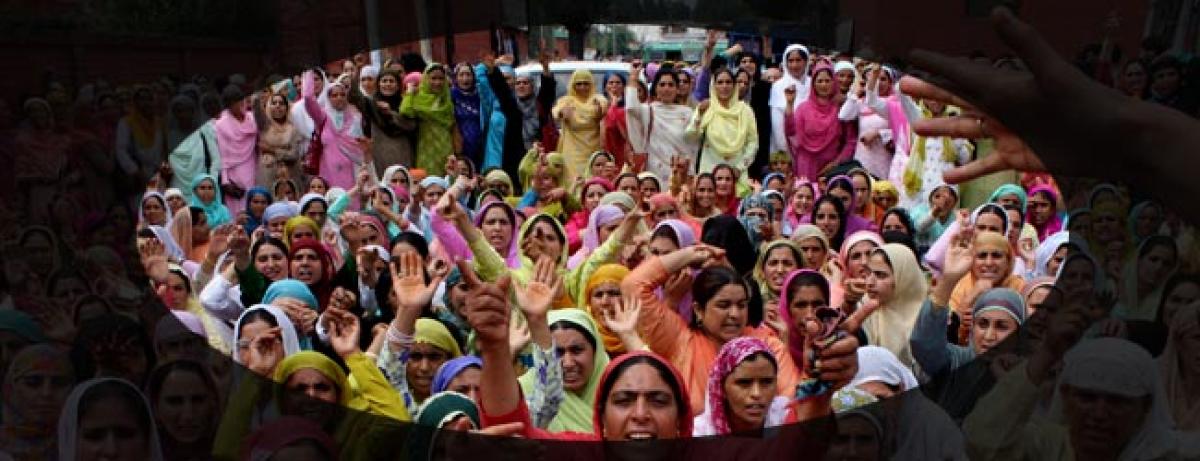Live
- Aaditya Thackeray Calls For EOW Probe Into Mumbai's Rs 7,000 Crore Road Project
- Omar Abdullah Urges Congress To Earn INDIA Bloc Leadership Role
- Yogi Adityanath Contrasts Historical And Modern Treatment Of Workers In India
- Historic Temple In Sambhal Reopens After 46-Year Closure Following 1978 Riots
- Officials directed to work for deeper reach of guarantees
- Delay In 'One Nation, One Election' Bills Introduction Announced
- Exhilarating ‘Benchmark’ of Venkat Changavalli
- Development activities worth `30 cr launched in Puthalapattu constituency
- Allegations against KTR baseless: BRS leader
- Megastar Chiranjeevi to Visit Allu Arjun’s Residence at 12 PM Today
Just In
Residents of conflict ridden Kashmir Valley battle mental illness


On any given day, hundreds of people, many of them hiding their faces, overcrowd this dilapidated psychiatric hospital in Srinagar to seek treatment for stress and other psychology-related disorders.
Srinagar: On any given day, hundreds of people, many of them hiding their faces, overcrowd this dilapidated psychiatric hospital in Srinagar to seek treatment for stress and other psychology-related disorders.
The numbers of patients suffering from mental health issues is on the rise in the conflict-ridden Kashmir Valley.
Colloquially it is still referred to as the "pagal khaana" or the mental asylum and there is a social stigma attached to visiting this pink building in the byzantine lanes of Kathidarwaza in the old Srinagar city.
Experts and the doctors at the hospital -- one of the only two mental healthcare facilities available in Jammu and Kashmir -- are of the view that the state has a huge deficiency in infrastructure and trained manpowe to treat patients with psychiatric issues.
Showkat Shah, who teaches psychology at the Kashmir University, said the crisis has been largely ignored despite being one of the greatest challenges Kashmiris face today.
"The well-being of the people is ignored and compromised," Shah said, referring to the mental health care infrastructure available in the state.
Decades of separatist armed conflict, which has left tens of thousands of people dead, many more maimed and thousands jailed, have taken a toll on the residents. Surveys suggest that as a result of daily violence many people suffer from mental health disorders.
A recent survey conducted by the global aid group, Medecins Sans Frontieres (MSF or Doctors Without Boundaries), found that 45 percent adults in the Kashmir Valley may have "significant symptoms" of mental distress while 41 percent of the population is living with symptoms of depression.
An estimated 26 percent population lives with the symptoms of anxiety-related disorders while 19 percent people are suffering from post stress traumatic disorder, the survey found.
Till recently, the Kathidarwaza hospital was the only medical facility available for mentally ill patients in the state of 12.5 million people.
To offset the rush, the government recently opened counselling centres at the Shri Maharaja Hari Singh (SMHS) Hospital and the SKIMS Medical College in Srinagar. They too remain equally crowded on any day.
Yasir Hassan Rather, an associate professor at the Kathidarwaza hospital, said the state is suffering from "grossly understaffed and insufficient facilities" in mental health facilities.
"We don't have trained clinical psychologists and counsellors and no recreational facilities are available for patients in the Kathidarwaza hospital," Rather said.
"With growing awareness about mental health issues, the hospital is seeing a huge influx of patients." Around 100,000 patients visited last year, he said, adding "it is difficult for us to manage with limited resources and manpower."
The government of India had sanctioned a special grant for upgrading the hospital in 2010. But despite regular reminders by the hospital administration, nothing has happened.
Shah said given the grave situation in the valley where many have had near-death experiences, or have seen people getting killed or maimed, the need was to have trained clinical psychologists at every health centre.
In such a situation, Shah said, "patients with mental ailments end up visiting general physicians who in all likelihood prescribe them anti-anxiety drugs".
Sameer Matto, who was the director, health services, in Kashmir till last month, said the government is in the process of building proper mental health infrastructure in Kashmir. "We have established mental health units and more will follow," Matto said.
By Javaid Trali
(The author is a Srinagar-based freelance journalist. He can be contacted at [email protected])

© 2024 Hyderabad Media House Limited/The Hans India. All rights reserved. Powered by hocalwire.com






